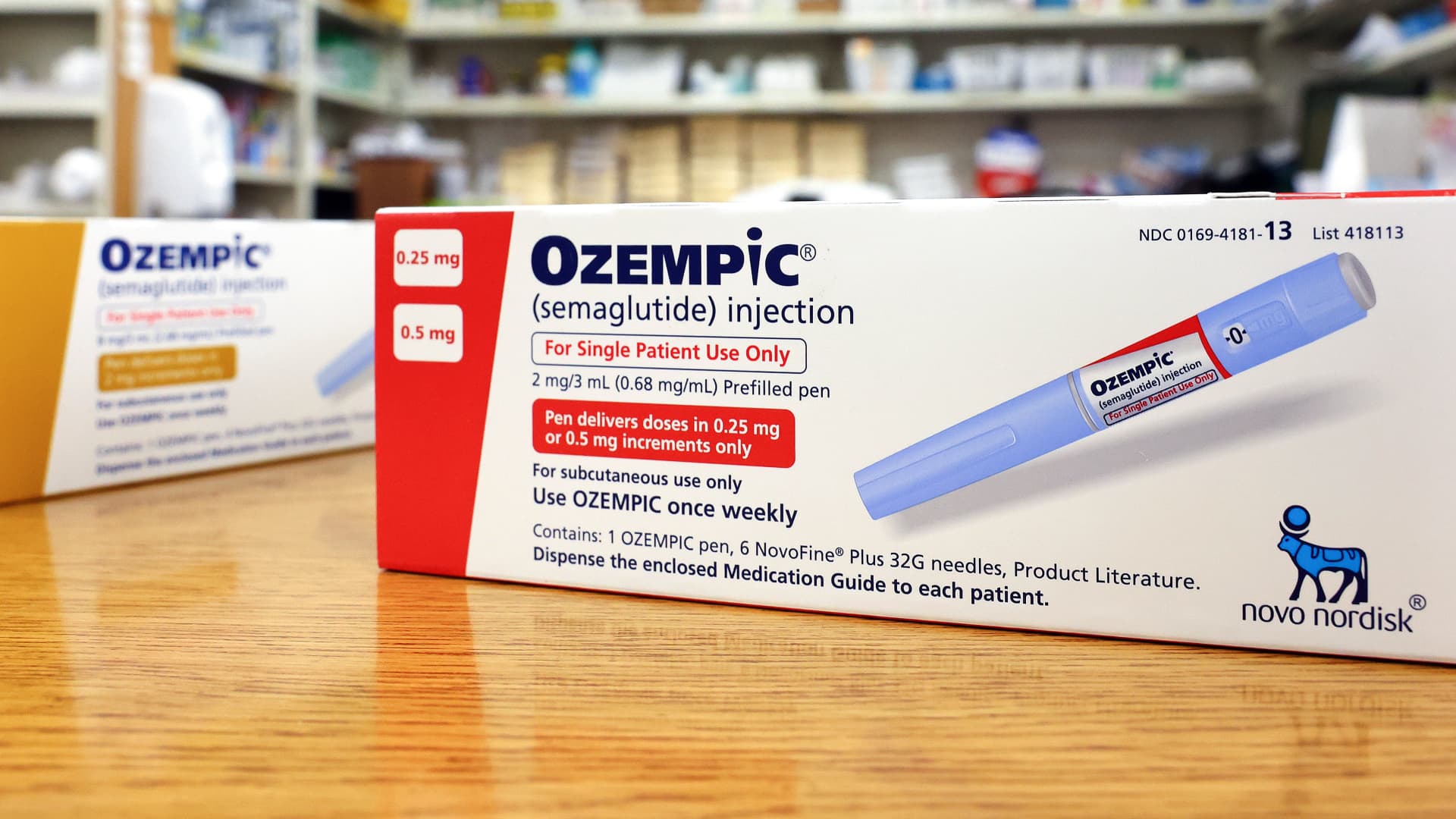EU expands Ozempic probe over suicide risks
In this photo illustration, boxes of the diabetes drug Ozempic rest on a pharmacy counter in Los Angeles, April 17, 2023.
Mario Tama | Getty Images
The European Union’s drug regulator on Tuesday said it has broadened an investigation into the risk of suicidal thoughts and self-injury among patients taking Novo Nordisk‘s Ozempic, Wegovy and Saxenda drugs to include other weight loss and diabetes medications.
The European Medicines Agency didn’t specify which additional drugs are now included in the investigation, but it could potentially include Eli Lilly‘s diabetes drug Mounjaro, which is approved in the EU. Other companies such as Pfizer and Amgen are developing similar products.
The EMA said it is now evaluating about 150 reports of possible cases of self-injury and suicidal thoughts in patients taking weight loss and diabetes drugs. It’s still unclear if the medicines caused the events or whether they are linked to patients’ underlying conditions or other factors, the statement said.
The EMA expects to finish its probe in November, according to a statement.
On Monday, the agency told CNBC it launched an investigation into the matter after the Icelandic Medicines Agency flagged three cases of suicidal thoughts and self-injury in patients taking drugs containing liraglutide and semaglutide.
Liraglutide is the active ingredient in Novo Nordisk’s weight loss drug Saxenda. Semaglutide is the active ingredient in the Danish company’s weight loss injection, Wegovy, and its diabetes counterpart, Ozempic.
Liraglutide and semaglutide are part of a class of highly popular drugs called GLP-1 receptor agonists.
They mimic a hormone produced in the gut called GLP-1 to suppress a person’s appetite and ultimately aid with weight loss. Those drugs can also help people manage Type 2 diabetes because they encourage insulin release from the pancreas, lowering blood sugar levels.
Novo Nordisk said in a statement to CNBC on Monday that “safety data collected from large clinical trial programs and post marketing surveillance have not demonstrated a causal association between semaglutide or liraglutide and suicidal and self-harming thoughts.”
The company said it is “continuously performing surveillance of the data from ongoing clinical trials and real-world use of its products and collaborates closely with the authorities to ensure patient safety and adequate information to healthcare professionals.”
The EMA’s investigation could potentially establish new side effects associated with blockbuster drugs such as Wegovy and Ozempic, which are already known to cause nausea, vomiting and diarrhea.
Suicidal behavior is not currently listed as a side effect in the EU product information for any GLP-1 receptor agonists.
The U.S. prescribing information for Novo Nordisk’s Saxenda, approved by the Food and Drug Administration, also does not list suicidal thoughts or self-injury as side effects. But it does include a recommendation to monitor patients for depression or suicidal thoughts and to discontinue the drug if symptoms develop.
Clinical trials in adults found nine of 3,300 people on Saxenda reported suicidal ideation. That’s compared with two of more than 1,900 people on a placebo. The prescribing information says “there was insufficient information to establish a causal relationship to Saxenda.”
There is no similar warning in the U.S. prescribing information for Ozempic.
Wegovy’s U.S. prescribing information notes suicidal ideation and behavior have been reported in clinical trials for other weight management products. Patients on Wegovy should be monitored for depression and suicidal thoughts or behavior, the information says.
If you are having suicidal thoughts, contact the Suicide & Crisis Lifeline in the U.S. at 988 or the Samaritans in the U.K. at 116 123.
No Byline Policy
Editorial Guidelines
Corrections Policy
Source
